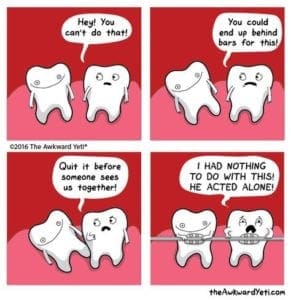A common question I’m asked by parents is ‘Does my child need braces?’ or ‘When should my child see an orthodontist?’ During dental check-ups for children, I routinely check for mal-positioned teeth, crowded teeth and missing teeth which may be caught behind or underneath another tooth. Some of these characteristics, such as crowding, are readily perceived by the parents by general observation, but without careful assessment the extent and severity of these conditions may be underestimated.
For children aged between seven to ten, there is still a lot of growth potential left, where the jaw can grow and expand. After all the baby teeth have fallen out, the adult teeth may come into the mouth well-aligned and in the right position. That’s the best case scenario! And if I assess this to be the most likely outcome, I let parents know of this, and instead of immediately referring to the orthodontist, we can continue to monitor every 6 months. In many cases braces are simply not necessary.
However, there are some problems which children will not simply ‘grow out of’. And even more significantly, if we can intervene early with these problems, it may prevent the need for further orthodontic treatment or may lessen the amount of treatment in the future, which will make life much easier for your child.

Teeth have a mind of their own! The image above demonstrates the importance of early detection, because if – for lack of a better name – the ‘tipsy tooth’ had been detected and treated earlier before it had tilted so significantly, further intervention (in this case, braces) may not have been needed.
In other situation, the psychological impact of crooked teeth may be enough of a justification, so the child does not develop any issues with self-esteem or self-consciousness. It may be a large gap between the front teeth, a ‘gummy smile’ or teeth which are excessively flared out. If it is a condition which will self-resolve (many patients around ages 8-9 develop a transient gap between the front teeth which self-corrects), I will explain this to the parent and child, and sometimes reassurance is all that is required. But if it isn’t going to self-resolve, a visit to the orthodontist may be the best thing for the child.

